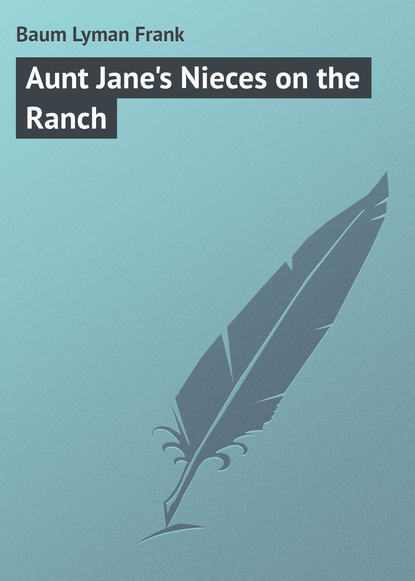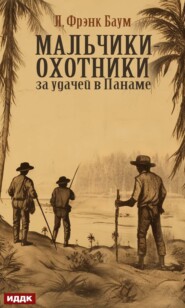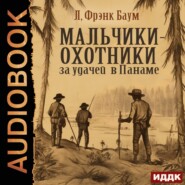По всем вопросам обращайтесь на: info@litportal.ru
(©) 2003-2024.
✖
Aunt Jane's Nieces on the Ranch
Автор
Год написания книги
2017
Настройки чтения
Размер шрифта
Высота строк
Поля
“Who sleeps, Inez?” demanded the aged Miguel. “Ees it the new nurse, or Mees Jane?”
“Both, perhap.” She laughed scornfully and went out to the shed that connected two of the adobe dwellings and served as a shady lounging place. Here a group quickly formed around her, including those who followed from the hut.
“I shall kill her, some day,” declared the girl, showing her gleaming teeth. “What right have she to come an’ take our baby?”
Miguel stroked his white moustache reflectively.
“Ees this Meeldred good to Mees Jane?” he asked.
“When anyone looks, yes,” replied Inez reluctantly. “She fool even baby, some time, who laugh at her. But poor baby do not know. I know. This Meeldred ees a devil!” she hissed.
The listening group displayed no emotion at this avowal. They eyed the girl attentively, as if expecting to hear more. But Inez, having vented her spite, now sulked.
“Where she came from?” asked Miguel, the recognized spokesman.
“Back there. New York,” tossing her head in an easterly direction.
“Why she come?” continued the old man.
“The little mans with no hair – Meest Merrick – he think I not know about babies. He think this girl who learns babies in school, an’ from books, know more than me who has care for many baby – but for none like our Mees Jane. Mees Jane ees angel!”
They all nodded in unison, approving her assertion.
“Eet ees not bad thought, that,” remarked old Bella. “Books an’ schools ees good to teach wisdom.”
“Pah! Not for babies,” objected her husband, shaking his head. “Book an’ school can not grow orange, either. To do a thing many time ees to know it better than a book can know.”
“Besides,” said Inez, “this Meeldred ees witch-woman.”
“Yes?”
“I know it. She come from New York. But yesterday she say to me: ‘Let us wheel leetle Jane to the live oak at Burney’s.’ How can she know there is live oak at Burney’s? Then, the first day she come, she say: ‘Take baby’s milk into vault under your room an’ put on stone shelf to keep cool.’ I, who live here, do not know of such a vault. She show me some stone steps in one corner, an’ she push against stone wall. Then wall open like door, an’ I find vault. But how she know it, unless she is witch-woman?”
There was a murmur of astonishment. Old Miguel scratched his head as if puzzled.
“I, too, know about thees vault,” said he; “but then, eet ees I know all of the old house, as no one else know. Once I live there with Señor Cristoval. But how can thees New York girl know?”
There was no answer. Merely puzzled looks.
“What name has she, Inez?” suddenly asked Miguel.
“Travers. Meeldred Travers.”
The old man thought deeply and then shook his head with a sigh.
“In seexty year there be no Travers near El Cajon,” he asserted. “I thought maybe she have been here before. But no. Even in old days there ees no Travers come here.”
“There ees a Travers Ranch over at the north,” asserted Bella.
“Eet ees a name; there be no Travers live there,” declared Miguel, still with that puzzled look upon his plump features.
Inez laughed at him.
“She is witch-woman, I tell you. I know it! Look in her eyes, an’ see.”
The group of Mexicans moved uneasily. Old Miguel deliberately rolled a cigarette and lighted it.
“Thees woman I have not yet see,” he announced, after due reflection. “But, if she ees witch-woman, eet ees bad for Mees Jane to be near her.”
“That is what I say!” cried Inez eagerly. She spoke better English than the others. “She will bewitch my baby; she will make it sickly, so it will die!” And she wrung her hands in piteous misery.
The Mexicans exchanged frightened looks. Old Bella alone seemed unaffected.
“Mees Weld own her baby – not us,” suggested Miguel’s wife. “If Mees Weld theenk thees girl is safe nurse, what have we to say – eh?”
“I say she shall not kill my baby!” cried Inez fiercely. “That is what I say, Bella. Before she do that, I kill thees Meeldred Travers.”
Miguel examined the girl’s face intently.
“You are fool, Inez,” he asserted. “It ees bad to keel anything – even thees New York witch-woman. Be compose an’ keep watch. Nothing harm Mees Jane if you watch. Where are your folks, girl?”
“Live in San Diego,” replied Inez, again sullen.
“Once I know your father. He ees good man, but drink too much. If you make quarrel about thees new nurse, you get sent home. Then you lose Mees Jane. So keep compose, an’ watch. If you see anything wrong, come to me an’ tell it. That ees best.”
Inez glanced around the group defiantly, but all nodded approval of old Miguel’s advice. She rose from the bench where she was seated, shrugged her shoulders disdainfully and walked away without a word.
CHAPTER VI – A DINNER WITH THE NEIGHBORS
Escondido, the nearest town and post office to El Cajon Ranch, is a quaint little place with a decided Mexican atmosphere. Those California inhabitants whom we call, for convenience, “Mexicans,” are not all natives of Mexico, by any means. Most of them are a mixed breed derived from the early Spanish settlers and the native Indian tribes – both alike practically extinct in this locality – and have never stepped foot in Mexican territory, although the boundary line is not far distant. Because the true Mexican is generally a similar admixture of Indian and Spaniard, it is customary to call these Californians by the same appellation. The early Spaniards left a strong impress upon this state, and even in the newly settled districts the Spanish architecture appropriately prevails, as typical of a semi-tropical country which owed its first civilizing influences to old Spain.
The houses of Escondido are a queer mingling of modern bungalows and antique adobe dwellings. Even the business street shows many adobe structures. A quiet, dreamy little town, with a comfortable hotel and excellent stores, it is much frequented by the wealthy ranchers in its neighborhood.
After stopping at the post office, Arthur drove down a little side street to a weather-beaten, unprepossessing building which bore the word “Restaurant” painted in dim white letters upon its one window. Here he halted the machine.
“Oh,” said Beth, drawing a long breath. “Is this one of your little jokes, Arthur?”
“A joke? Didn’t we come for luncheon, then?”
“We did, and I’m ravenous,” said Patsy. “But you informed us that there is a good hotel here, on the main street.”
“So there is,” admitted Arthur; “but it’s like all hotels. Now, this is – different. If you’re hungry; if you want a treat – something out of the ordinary – just follow me.”
Louise was laughing at their doubting expressions and this care-free levity led them to obey their host’s injunction. Then the dingy door opened and out stepped a young fellow whom the girls decided must be either a cowboy or a clever imitation of one.
He seemed very young – a mere boy – for all his stout little form. He was bareheaded and a shock of light, tow-colored hair was in picturesque disarray. A blue flannel shirt, rolled up at the sleeves, a pair of drab corduroy trousers and rough shoes completed his attire. Pausing awkwardly in the doorway, he first flushed red and then advanced boldly to shake Arthur’s hand.
“Why, Weldon, this is an unexpected pleasure,” he exclaimed in a pleasant voice that belied his rude costume, for its tones were well modulated and cultured. “I’ve been trying to call you up for three days, but something is wrong with the line. How’s baby?”

















